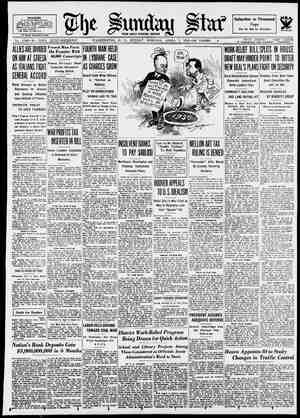Evening Star Newspaper, April 7, 1935, Page 58
You have reached the hourly page view limit. Unlock higher limit to our entire archive!
Subscribers enjoy higher page view limit, downloads, and exclusive features.
F2 WHEN A GHOST RIDES ALONG OLD TEL THE SUNDAY By Mary Porter Russell. T IS 1n the twilight that the man appears—the gaunt. still, man with the ravaged face. He is on horseback, and his horse walks slowly, always slowly, with the mournful solemnity of a funeral march. The man looks at the horse now and then a little furtively, as if fearful of the animal's censure fer a deed long done. Beside him he leads another horse, a horse that is strange- ly riderless. This apparition is said to have been seen frequently years ago by travelers on the old Telegraph road between Alexandria and the historic Pohick Church, where George Wash- ington was once a pew holder and an officer. Pirey Hill, across from Hay- fleld, the Lund Washington estate, marked the exact spot of the grim horseman’s appearance. The main road has been changed since then so that it no longer follows the same route around Piney Hill and few motorists now venture on the old, un- kept road, whose uneven surface holds perils for the automobile as well as & promise of ghostly encounters. Miss Virginia Bell and her sister, Miss Leila, are perhaps the only per- sons in the neighborhood of Pohick Church who remember 2ctually hav- ing seen the horseman and can de- seribe him at first hand instead of through hearsay. It was Miss Vir- ginia who consented to tell the tale. “See the horseman? Indeed I did! More than 30 years ago, 1t must have been, but I can see him as plainly still as if it were yesterday!” HE afternoon sun came through the windows of Miss Virginia's ancient hcuse. All the way to the time. I can tell you about it better after the sun goes down.” | Miss Virginia does not claim to be | | an authority on ghosts and she re- | fuses to argue with those who believe them non-existent. “I can only tell you what I have seen,” she says, “and you can form your own opinion. Of | course, this part of Virginia is filled | with ghost stories and to most of them. I pay not one bit of attention. It's just the ones I really know something about that I ever tell. After all, when you have seen a thing with your own | eyes—well, there are certain things in | this world that are hard to explain— ! that's all. T don't know of any ghost stories about Pohick Church itself. That's strange, isn't i{t? One would suspect | it of being full of them. it's so very | old, you krow. Did I tell you our pew was next to George Washington's?” | here's a good story about the | altar rail,” Miss Leila volunteered. “A ‘Yankee soldier took two of the spokes | from the rail during the Civil War. | Nothing was known of them until a | few years ago, when he wrote from California that he had the spokes and would send one of them back if the church would forward him the post- age. Wasn't that just—" “But that isn’t & ghost story,” said Miss Virginia. “We don't know of any spooky tales about this house we live in, either, though visitors insist we must be keeping something from them. I tell my sister that perhaps | we just don’t see them. It is said, you know, that some ghosts are vis- | ible only to certain eyes.” | “Maybe you'd think ghosts had something to do with our drawing room ceiling falling in.” Miss Leila threw open the door of a nearby | | room, revealing the devastation with- in. The plaster had fallen from the entire middle portion of the ceiling and lay in cracked ruins upon the floor. Plaster dust lay in a chalky film upon the closed piano, upon the curved legs of parlor chairs, upon old mahogany tables. “It happened this morning while we were at church.” The light came dimly through the | shaded windows and fell upon a | broken vase in Miss Leila’s hands. | “We don’t use this room much now. | It is where Virginia and I had our STAR, WASHINGTON, D. €, APRIL 7, 1935—PART FOUR. Across the Potomac There Travels a Man on Horseback, According to the Old Story— And Here Are Some of the Inti- mate Détails—But There Are Other Virginia Ghosts Also, and Nearly All of Them as a Result of Unhappy Love Affairs. (T ’,w;r